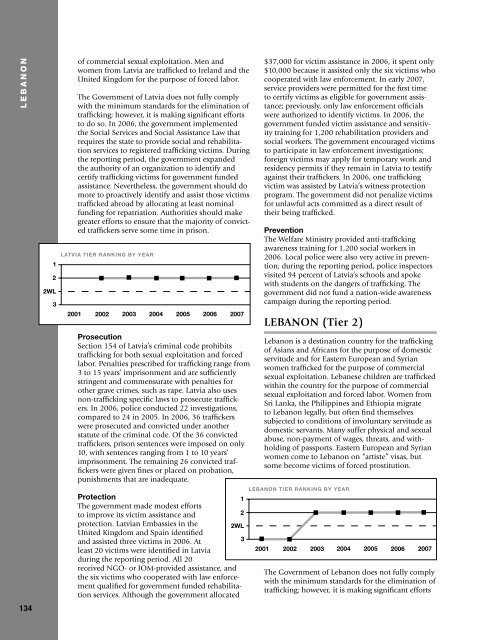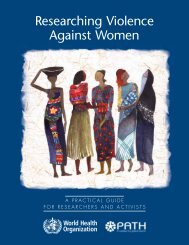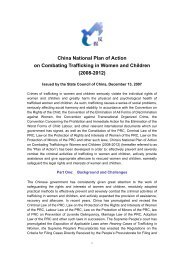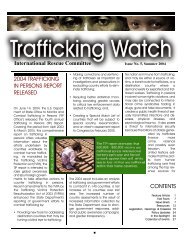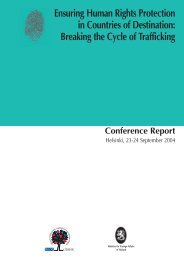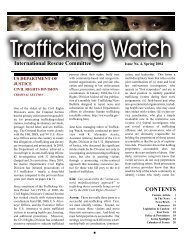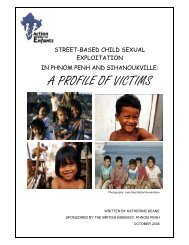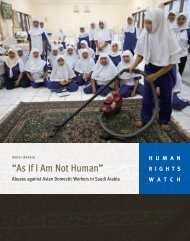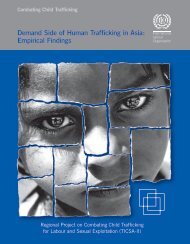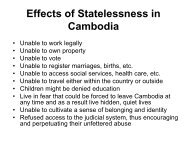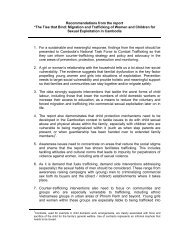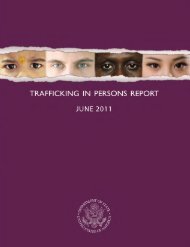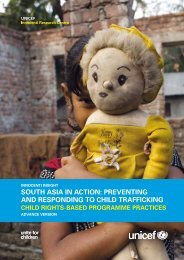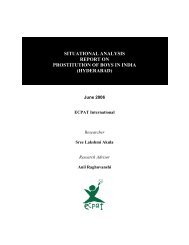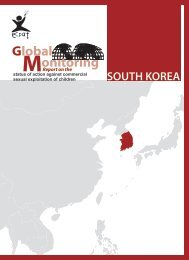2007 Trafficking in Persons Report - Center for Women Policy Studies
2007 Trafficking in Persons Report - Center for Women Policy Studies
2007 Trafficking in Persons Report - Center for Women Policy Studies
You also want an ePaper? Increase the reach of your titles
YUMPU automatically turns print PDFs into web optimized ePapers that Google loves.
L E B A N O N<br />
134<br />
of commercial sexual exploitation. Men and<br />
women from Latvia are trafficked to Ireland and the<br />
United K<strong>in</strong>gdom <strong>for</strong> the purpose of <strong>for</strong>ced labor.<br />
The Government of Latvia does not fully comply<br />
with the m<strong>in</strong>imum standards <strong>for</strong> the elim<strong>in</strong>ation of<br />
traffick<strong>in</strong>g; however, it is mak<strong>in</strong>g significant ef<strong>for</strong>ts<br />
to do so. In 2006, the government implemented<br />
the Social Services and Social Assistance Law that<br />
requires the state to provide social and rehabilitation<br />
services to registered traffick<strong>in</strong>g victims. Dur<strong>in</strong>g<br />
the report<strong>in</strong>g period, the government expanded<br />
the authority of an organization to identify and<br />
certify traffick<strong>in</strong>g victims <strong>for</strong> government funded<br />
assistance. Nevertheless, the government should do<br />
more to proactively identify and assist those victims<br />
trafficked abroad by allocat<strong>in</strong>g at least nom<strong>in</strong>al<br />
fund<strong>in</strong>g <strong>for</strong> repatriation. Authorities should make<br />
greater ef<strong>for</strong>ts to ensure that the majority of convicted<br />
traffickers serve some time <strong>in</strong> prison.<br />
Prosecution<br />
Section 154 of Latvia’s crim<strong>in</strong>al code prohibits<br />
traffick<strong>in</strong>g <strong>for</strong> both sexual exploitation and <strong>for</strong>ced<br />
labor. Penalties prescribed <strong>for</strong> traffick<strong>in</strong>g range from<br />
3 to 15 years’ imprisonment and are sufficiently<br />
str<strong>in</strong>gent and commensurate with penalties <strong>for</strong><br />
other grave crimes, such as rape. Latvia also uses<br />
non-traffick<strong>in</strong>g specific laws to prosecute traffickers.<br />
In 2006, police conducted 22 <strong>in</strong>vestigations,<br />
compared to 24 <strong>in</strong> 2005. In 2006, 36 traffickers<br />
were prosecuted and convicted under another<br />
statute of the crim<strong>in</strong>al code. Of the 36 convicted<br />
traffickers, prison sentences were imposed on only<br />
10, with sentences rang<strong>in</strong>g from 1 to 10 years’<br />
imprisonment. The rema<strong>in</strong><strong>in</strong>g 26 convicted traffickers<br />
were given f<strong>in</strong>es or placed on probation,<br />
punishments that are <strong>in</strong>adequate.<br />
Protection<br />
The government made modest ef<strong>for</strong>ts<br />
to improve its victim assistance and<br />
protection. Latvian Embassies <strong>in</strong> the<br />
United K<strong>in</strong>gdom and Spa<strong>in</strong> identified<br />
and assisted three victims <strong>in</strong> 2006. At<br />
least 20 victims were identified <strong>in</strong> Latvia<br />
dur<strong>in</strong>g the report<strong>in</strong>g period. All 20<br />
received NGO- or IOM-provided assistance, and<br />
the six victims who cooperated with law en<strong>for</strong>cement<br />
qualified <strong>for</strong> government funded rehabilitation<br />
services. Although the government allocated<br />
$37,000 <strong>for</strong> victim assistance <strong>in</strong> 2006, it spent only<br />
$10,000 because it assisted only the six victims who<br />
cooperated with law en<strong>for</strong>cement. In early <strong>2007</strong>,<br />
service providers were permitted <strong>for</strong> the first time<br />
to certify victims as eligible <strong>for</strong> government assistance;<br />
previously, only law en<strong>for</strong>cement officials<br />
were authorized to identify victims. In 2006, the<br />
government funded victim assistance and sensitivity<br />
tra<strong>in</strong><strong>in</strong>g <strong>for</strong> 1,200 rehabilitation providers and<br />
social workers. The government encouraged victims<br />
to participate <strong>in</strong> law en<strong>for</strong>cement <strong>in</strong>vestigations;<br />
<strong>for</strong>eign victims may apply <strong>for</strong> temporary work and<br />
residency permits if they rema<strong>in</strong> <strong>in</strong> Latvia to testify<br />
aga<strong>in</strong>st their traffickers. In 2006, one traffick<strong>in</strong>g<br />
victim was assisted by Latvia’s witness protection<br />
program. The government did not penalize victims<br />
<strong>for</strong> unlawful acts committed as a direct result of<br />
their be<strong>in</strong>g trafficked.<br />
Prevention<br />
The Welfare M<strong>in</strong>istry provided anti-traffick<strong>in</strong>g<br />
awareness tra<strong>in</strong><strong>in</strong>g <strong>for</strong> 1,200 social workers <strong>in</strong><br />
2006. Local police were also very active <strong>in</strong> prevention;<br />
dur<strong>in</strong>g the report<strong>in</strong>g period, police <strong>in</strong>spectors<br />
visited 94 percent of Latvia’s schools and spoke<br />
with students on the dangers of traffick<strong>in</strong>g. The<br />
government did not fund a nation-wide awareness<br />
campaign dur<strong>in</strong>g the report<strong>in</strong>g period.<br />
LEBANON (Tier 2)<br />
Lebanon is a dest<strong>in</strong>ation country <strong>for</strong> the traffick<strong>in</strong>g<br />
of Asians and Africans <strong>for</strong> the purpose of domestic<br />
servitude and <strong>for</strong> Eastern European and Syrian<br />
women trafficked <strong>for</strong> the purpose of commercial<br />
sexual exploitation. Lebanese children are trafficked<br />
with<strong>in</strong> the country <strong>for</strong> the purpose of commercial<br />
sexual exploitation and <strong>for</strong>ced labor. <strong>Women</strong> from<br />
Sri Lanka, the Philipp<strong>in</strong>es and Ethiopia migrate<br />
to Lebanon legally, but often f<strong>in</strong>d themselves<br />
subjected to conditions of <strong>in</strong>voluntary servitude as<br />
domestic servants. Many suffer physical and sexual<br />
abuse, non-payment of wages, threats, and withhold<strong>in</strong>g<br />
of passports. Eastern European and Syrian<br />
women come to Lebanon on “artiste” visas, but<br />
some become victims of <strong>for</strong>ced prostitution.<br />
The Government of Lebanon does not fully comply<br />
with the m<strong>in</strong>imum standards <strong>for</strong> the elim<strong>in</strong>ation of<br />
traffick<strong>in</strong>g; however, it is mak<strong>in</strong>g significant ef<strong>for</strong>ts


